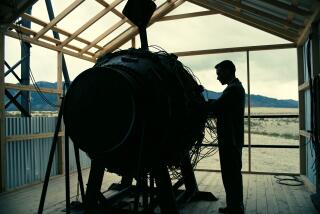A Diplomatic Bow Helps Ease Japan’s Ire
- Share via
TOKYO — In a small Japanese town, the American admiral bowed his head in contrition before grieving family members hanging on his every word. In the middle of the Pacific, the submarine commander wept as he delivered personal letters of apology.
For a nation where symbolism is important, the television images Thursday went a long way toward easing public anger and frustration over last month’s horrifying collision of a U.S. nuclear submarine and a Japanese high school training ship. But the United States should have done it weeks ago, say Japanese sociological, etiquette and legal experts.
Yes, Washington finally sent Adm. William Fallon, the Navy’s No. 2 officer, to the town of Uwajima to meet with the families of nine Japanese presumed dead in the Feb. 9 accident off Hawaii. And in Honolulu, Cmdr. Scott Waddle finally apologized, after merely expressing regret earlier. But the U.S. did several things backward, the experts say, and often only after significant political pressure--underscoring the very different roles apologies play and the varied meanings they have in the two societies.
At one level, Japanese apologize dozens of times a day--when entering a room, initiating a phone call, visiting a neighbor, giving a gift. Although in literal terms these are expressions of regret, in reality they are largely formulaic and don’t carry much weight.
“It’s a bit like Americans saying, ‘Nice to meet you,’ ” said Tatsumi Tanaka, president of Risk Hedge, a crisis management company. “It’s not as though they necessarily mean it.”
A very different set of rules and expectations applies, however, when a dispute or accident is more serious or contentious. In these cases, apologies play a key role in a nation that eschews confrontation and highly values group harmony.
In the Japanese context, Waddle, as the person most directly responsible for the accident, should have apologized first and quickly--well before President Bush. And ideally, he should have done so in person, by traveling to Uwajima, the tightknit community that is home to the families of the missing.
“What apologies represent is very different for Japanese than for Americans,” said Tamami Kondo, head of the Seishikai finishing school in Tokyo. “The first consideration isn’t how guilty you are but rather a desire to show your concern for hurting the other person’s heart.”
Those cultural differences are reflected in the respective legal systems as well. In the U.S., apologies carry a stronger connotation of guilt, so most people facing a legal challenge tend to sidestep responsibility or clam up early on. Waddle’s decision not to apologize or speak publicly about the accident was largely tied to his fears of legal liability, U.S. Ambassador Thomas S. Foley has repeatedly told the Japanese media in recent weeks.
In Japan, on the other hand, it’s important to apologize right away in court or even before a trial because it’s culturally expected and evidence of contrition can result in a greatly reduced sentence. “An apology comes first,” said Takao Tanase, law professor at Kyoto University. “In the U.S., you deny everything.”
The importance of a personal apology is seen in Japan’s own history of accidents.
When a Japan Airlines jet crashed in 1982 in Tokyo Bay at the hands of a deranged pilot, killing 24 people, the company president personally visited the home of each of the victims’ families. More recently, employees of the Snow Brand Milk company last summer called on every one of the company’s retail outlets in surrounding towns to convey their heartfelt regret after hundreds of consumers were poisoned by contaminated dairy products.
Although situations vary, if the case is grave enough to require a series of apologies--as in the sinking of the Ehime Maru fisheries vessel--these should ideally be made in ascending order of hierarchy, etiquette specialists say. From the Japanese perspective, the U.S. apologies often seemed to go up and down the chain in a rather disorganized fashion.
But in a recent move that was generally appreciated here, Adm. Fallon bowed while meeting with two family members of the missing at the U.S. Embassy in Tokyo on Wednesday.
Although foreigners are not expected to understand the subtleties of Japanese bowing, proper decorum calls for a tilt of 90 degrees in cases of deep regret. Particularly egregious cases, meanwhile, generally call for dogeza--literally, “sitting below ground”--a full kowtow with the kneeling supplicant’s head touching the floor.
This gesture is a modified version of hara-kiri, Japan’s tradition of ritual disembowelment, wherein a samurai was expected to take responsibility for a wrong on behalf of himself and the group, said the finishing school’s Kondo. “Japanese traditions were formed over centuries of living in an isolated, feudal society,” she said. “This helps explain why formality is so important.”
The president of JCO Co. performed dogeza before the national media after lax company procedures in September 1999 caused Japan’s worst nuclear accident. In that case, the mishandling of nuclear fuel at the company’s Tokaimura reprocessing plant killed two workers, contaminated dozens and terrified the nation. Likewise, the president of Yamaichi Securities performed dogeza when the firm went bankrupt in 1997.
As the expectation gap over the apology issue has widened between the United States and Japan amid rising frustration on both sides, the issue has taken on a political tone. Japan has given widespread coverage to a commentary piece in the Washington Post that pointed out that Japan continues to demand apologies in this case even though it hasn’t been forthcoming with its World War II apologies.
Japanese feel this is a bit of a cheap hit. Many here believe that the sub accident isn’t comparable to the decisions and complex social forces that were played out more than 50 years ago. Japan has issued apologies, albeit grudgingly, to Korea and China for wartime acts. Many also take the view that the U.S. and Europe forced Japan into the war by imposing a trade embargo.
Although there may be some validity to this belief, it still doesn’t explain why Japan invaded China in 1931, said Gregory Clark, president of Tama University. “The question of the war is a very delicate one,” he said. “This is where embarrassment and shame all come together.”
Although Japan places great emphasis on ritual apologies, it’s not enough to simply follow forms when making an apology. Above all else, you’re expected to convince the injured parties that you are serious and deeply regret what you’ve done. This may include an offer to do whatever is humanly possible to ease their pain.
This cultural expectation may partly explain why Washington has come under such pressure to continue the search for the victims well beyond any reasonable expectation that survivors can be found. And it’s also a factor in the strong push to raise the training vessel, no matter the cost or complications of salvaging a ship in 2,000 feet of water.
Also important are timing and context. Fallon’s humble apology, which took place just hours after a graduation ceremony that saw chairs left empty for the four missing students, was well received Thursday at the Uwajima high school. But the U.S. decision a day earlier to meet with family members at the U.S. Embassy compound in Tokyo was not.
“He should have gone to the high school first,” said Naoko Ito, president of the Japan Behavior Assn. “To bring these ordinary, small-town people into the embassy just emphasizes U.S. power and intimidates the families.”
Many Japanese also have expressed discomfort with the U.S. investigation, which saw disclosures leak out piecemeal. Japan is comfortable with a more organized approach with everything generally presented at once.
The fact that civilians were on board emerged days after the accident, contributing to an early impression that the Navy was hiding something, in effect undermining U.S. credibility.
Tamotsu Aoki, a culture expert at the National Institute for Policy Studies, said Japanese disenchantment is actually a reflection of the high regard Americans are generally held in and their reputation as friendly and direct people. “The Japanese still idealize America,” he said. “We felt betrayed.”
Ultimately, however, cultural differences aside, many Japanese say they are now convinced that Americans are truly sorry, even if their way of showing it was rather bungled by Japanese standards. Bush, the secretaries of State and Defense and several deputies and naval officers all tried to show their sincerity.
“American officials apologized at all different levels,” said Hirokazu Matsumoto, an analyst and retired professor of international relations. “This was a real tragedy, but many apologies were made with real feeling.”
More to Read
Sign up for Essential California
The most important California stories and recommendations in your inbox every morning.
You may occasionally receive promotional content from the Los Angeles Times.












